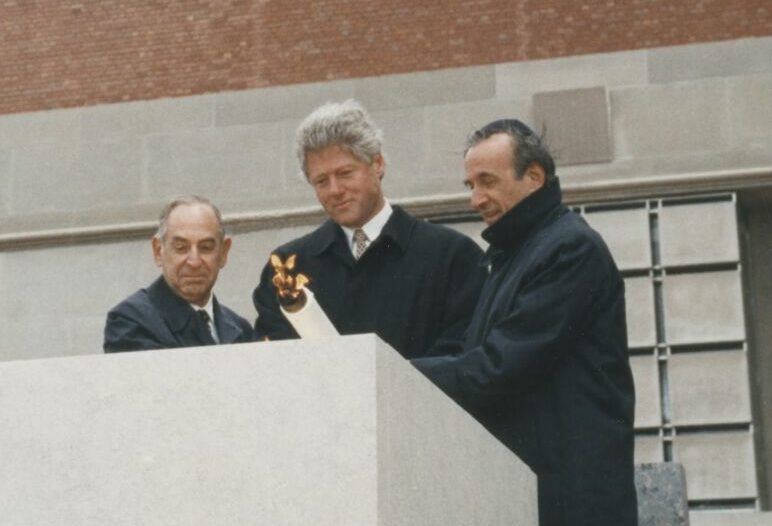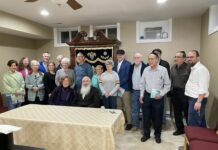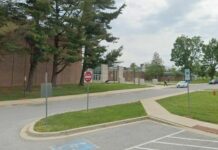By Andrew Lapin and Jillian Diamond

In 1986, eight years after Jimmy Carter established the President’s Commission on the Holocaust with Elie Wiesel as its chairman, little progress had been made on the Washington, D.C. memorial it was tasked to create.
The Holocaust survivor, memoirist and newly crowned Nobel Peace Prize laureate recognized he lacked the management and fundraising experience to build the museum and submitted his resignation.
His successor, Harvey “Bud” Meyerhoff, knew about buildings and philanthropy. Prominent in the Baltimore real estate business and philanthropies started by his father, Meyerhoff went on to raise the $150 million in private funds that built the U.S. Holocaust Memorial Museum on federal land on the southwest edge of the Mall in Washington, D.C.
Meyerhoff, a philanthropist who supported Jewish and cultural institutions in the Baltimore area, died on Sunday, Aug. 6, at 96. He leaves behind a legacy of giving and uplifting the local Jewish community through his charitable work.
“As chair [of the USHMM] for over six years — he succeeded Elie Wiesel — Bud guided the design, and oversaw the construction and fundraising that allowed the museum to open on time and on budget in 1993 — a task many considered impossible until he assumed the chair role,” his daughter, Lee Hendler, told the Baltimore Sun.
A lifelong Baltimore resident, Meyerhoff was born in 1927 and spent his early adulthood working with his father, Joseph Meyerhoff, who had already made a name for himself as a builder and philanthropist. The Baltimore Symphony Orchestra’s Joseph Meyerhoff Symphony Hall is named for him. Harvey Meyerhoff followed in his father’s philanthropic footsteps, directing the Joe and Harvey Meyerhoff Family Charitable Funds until the early 2000s. The charity is still dedicated to funding Baltimore-area Jewish programs, such as 4Front and J Life.
One of Harvey Meyerhoff’s most significant feats was his work with the USHMM. He chaired the U.S. Holocaust Memorial Council, the board of trustees of the museum, for over six years. In this role, he oversaw the construction of the museum. He got involved in the council through his first wife, Lyn.
“He’s the one who really steered the whole project to its very successful completion,” said Sara J. Bloomfield, the current director of the USHMM. “When Lyn became ill, he took over her responsibilities. It meant a lot to her to have him take over her leadership role.”
At the museum’s dedication ceremonies on April 22, 1993, Meyerhoff laid out his vision for the museum.
“By its very existence at the heart of our great democracy, this museum will teach generations to come not only about the awful events of the past, but about the awful consequences of bigotry, oppression, hatred and intolerance,” Meyerhoff said at the ceremonies. “And about the responsibilities that each of us has as citizens of a democratic society.”
Even after the Reagan administration decided to replace him shortly before the museum’s opening, Meyerhoff remained involved in the museum by serving on many of its committees. The museum initially struggled during its opening, and Bloomfield credits Meyerhoff’s dogged determination with helping them persist for so long.
“I don’t know if the museum would exist if not for Bud,” Bloomfield said. “He was so determined. He had such a vision for what this museum could be, and he saw it as a gift to the American people. There was a lot of opposition and skepticism during the early years, but none of it deterred him. He was undaunted.”
The museum recently celebrated its 30th anniversary, and it holds a Joseph and Rebecca Meyerhoff Lecture event every year in honor of Meyerhoff’s parents — many of which Harvey Meyerhoff attended.
Meyerhoff’s impact can also be felt at the Park School of Baltimore, a private school that his children attended. Harvey and Lyn Meyerhoff served on its board of trustees, with Harvey Meyerhoff also serving on the committee responsible for the school’s relocation to its new campus in 1959. Park now sits on a 100-acre campus featuring forests, a pond and many walking trails.
“It was Bud’s leadership that resulted in Park occupying the campus it now has, which is one of the most remarkable campuses anywhere,” said Daniel Paradis, Park’s head of school. “It’s an incredible, incredible gift we’re able to give our students thanks
to Bud’s donations and Bud’s leadership.”
One of Harvey Meyerhoff’s children, Hendler, would go on to also serve as the chair of the board at the school many years later.
“He helped set the course for Park’s future. There are few areas of the school that Bud and Lyn did not influence,” Paradis added. “The Meyerhoff legacy at Park is a long one. Park would not be the school it is today without Bud’s leadership and engagement.”
Harvey and Lyn Meyerhoff contributed to many Baltimore institutions. They helped found the National Aquarium in Baltimore and the Harvey M. and Lyn P. Meyerhoff Inflammatory Bowel Disease Center at Johns Hopkins Hospital. They were also supporters of the Baltimore Symphony Orchestra, the National Aquarium, the National Zoo, Baltimore Museum of Art, the Walters Art Museum and the Maryland Institute College of Art. Meyerhoff also had a minority stake in the Baltimore Orioles.
Meyerhoff is survived by wife Phyllis Meyerhoff; children Terry Rubenstein, Lee Hendler, Zoh Hieronimus and Joseph Meyerhoff II; stepchildren Susan Davis, Diane Wailes and Nancy Moye; 10 grandchildren and four step-grandchildren; 14 great-grandchildren; and many nieces and nephews. He was predeceased by first wife Lyn P. Meyerhoff, who died in 1988.







